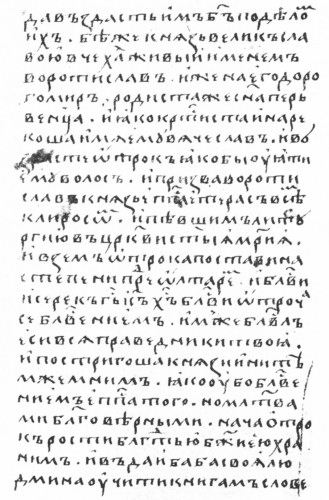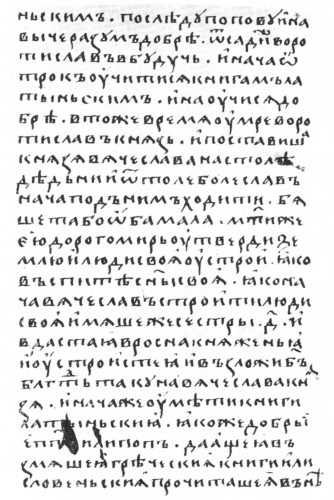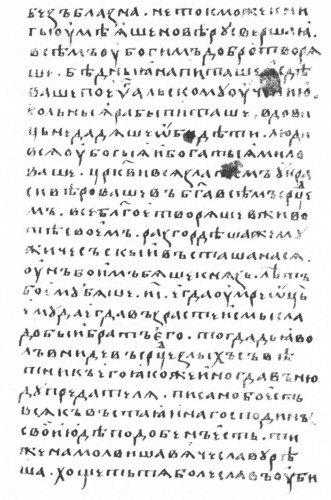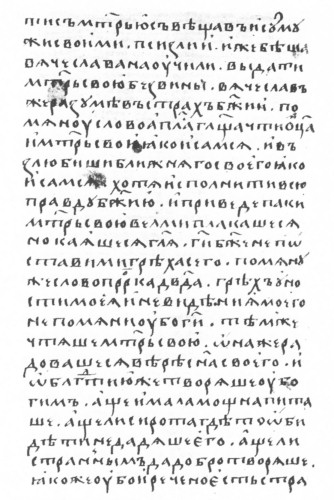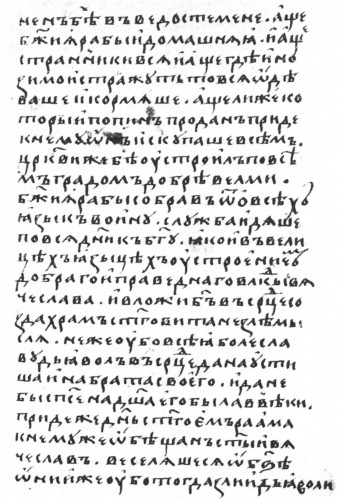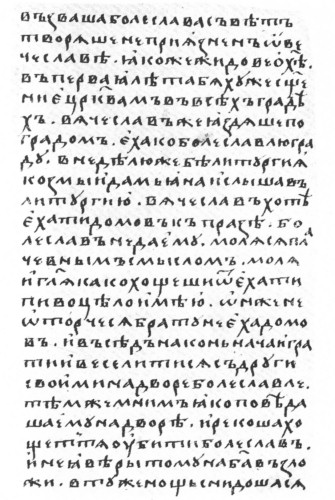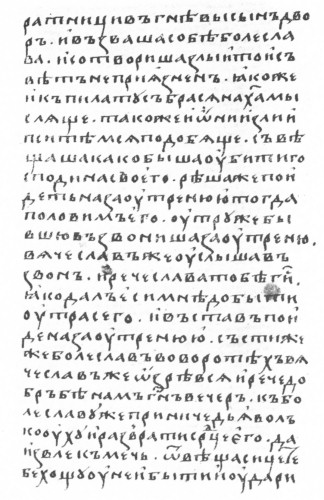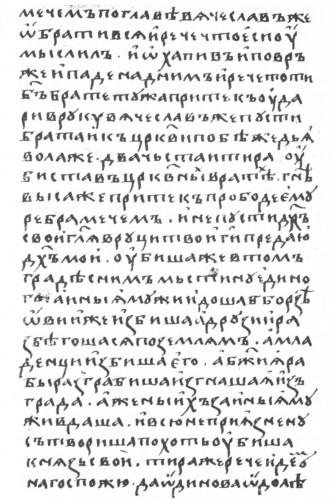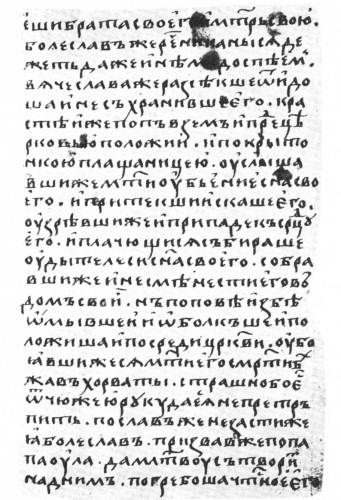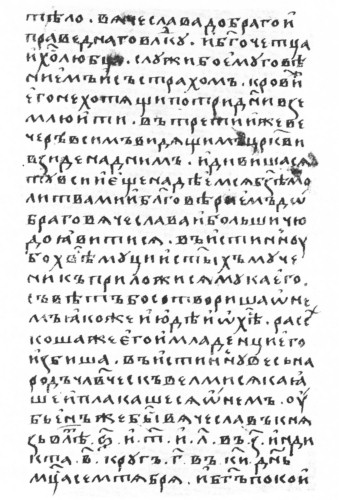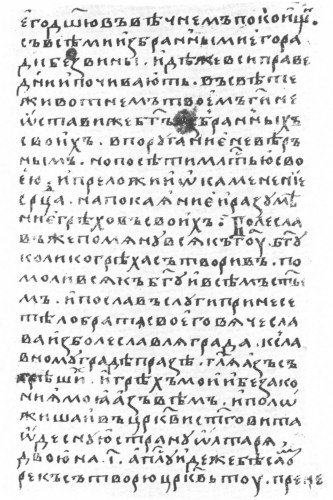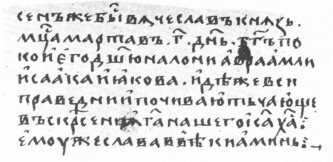THE LIFE OF WENCESLAS
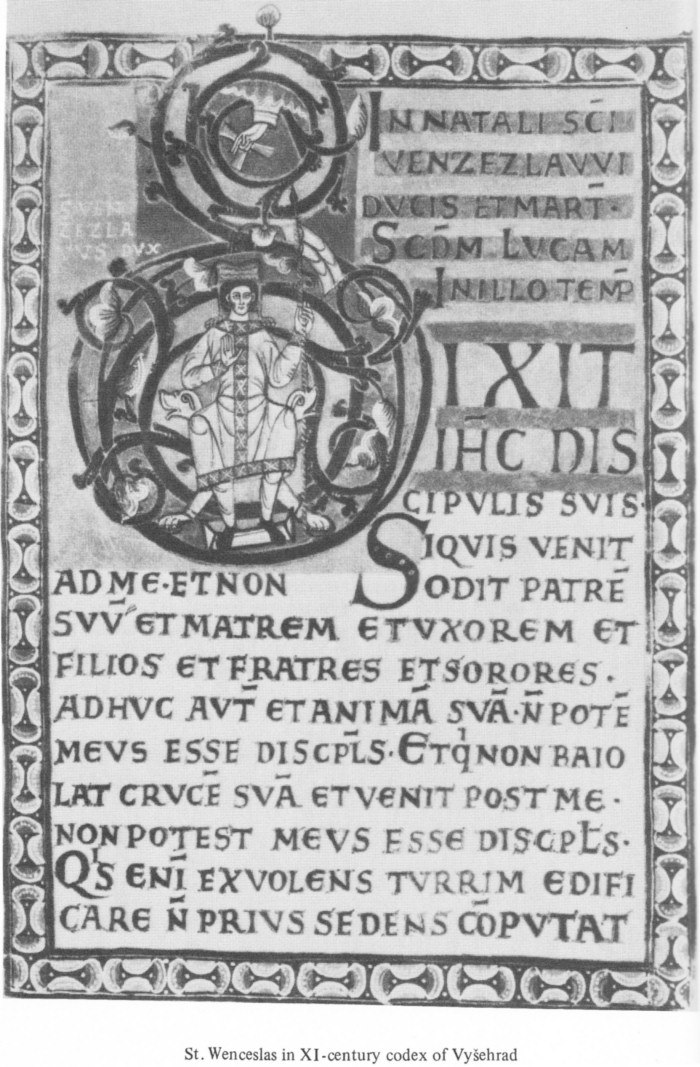
St. Wenceslas in XI-century codex of Vyšehrad
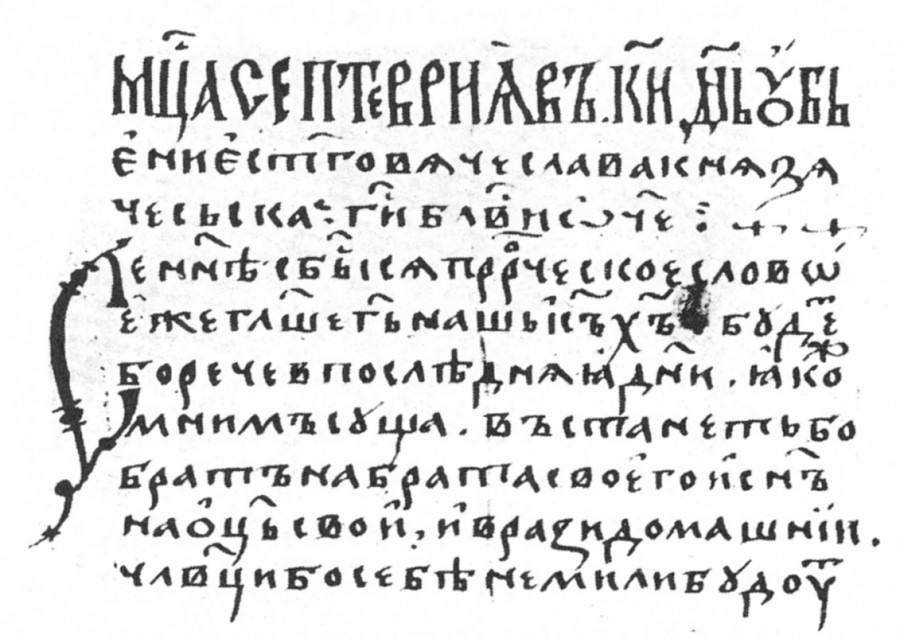
The Month of September on the Twenty-Eighth Day:
THE SLAYING OF SAINT WENCESLAS,
PRINCE OF THE CZECHS
Bless us Lord, Our Father!
Behold, the prophetic word, which spake Our Lord Jesus Christ, hath now come to pass: “For it shall be,” quoth he, “in the last days,” which we believe have come, “that brother shall rise against brother and son against father, [1] (Metthew 10:36) and a man’s foes shall be they of his own household. [2] For men shall be at variance one against the other,
141
![]()
![]()
142
and then God shall reward them all according to their works.” [3]
And there was living among the Czechs a prince of great renown by the name of Vratislav, [4] whose wife was Drahomira. [5] And they had a son, their first-born, whom they baptized and gave the name Wenceslas. [6] Now when the boy attained the age for the shearing of his hair, [7] Prince Vratislav summoned a bishop [8] along with the entire clergy. And while celebrating the Mass in the Church of Saint Mary. [9] he, raising the boy, placed him upon the steps before the altar and blessed him, saying: “O Lord Jesus Christ, bless this boy with the blessing with which Thou blessed all Thy righteous men.”
And, we believe, other princes were tonsured in this manner.
Thus, with the blessing and pious prayers of that bishop the boy began to grow, sheltered by God’s grace. And his grandmother Ludmila [10] entrusted him to the guidance of a priest, to be taught Slavic
![]()
143
letters. And he learned their meaning well. Then Vratislav sent him to Budec, where the boy began to study Latin letters. [11] And he learned them well.
But at this time Prince Vratislav died and Prince Wenceslas was placed upon the throne of his forefathers. [12] And from that day forth Boleslav [13] became subordinate to him. Since both were young, their mother Drahomira fortified the land and ruled the people until her sons were of age. Then Wenceslas began to rule the people.
Now Wenceslas had four sisters. And they were given in marriage to various princely houses and provided for. [14] And God bestowed such grace upon Prince Wenceslas that he came to understand Latin letters like a good bishop or priest. And taking up Greek or Slavic letters, [11] he would read clearly and without error. Yea, not only did
![]()
144
he fathom letters but he fulfilled his faith as well. He rendered good unto all the needy, and fed and worked for the sake of the poor, according to the teachings of the Gospel: He fed sick slaves, defended widows, and had mercy upon all people, both the wanting and the wealthy. And he adorned all the churches with gold, believed in God with all his heart, and did all manner of good in his life. [15]
But Czech men waxed proud and rose against one another, for their prince was young, being 18 years of age when his father died. [16] And when he came of age and his brother attained his maturity, the Devil entered into the hearts of his brother’s evil counselors, as once he did into Judas the traitor. [17] For it is written: “Whosoever rises against his lord is like unto a Judas.” [18]
And Wenceslas was incited, being told: “Boleslav wishes to slay you and has taken counsel with his mother and his men.” [19]
![]()
145
Evil dogs! Without cause they instructed Wenceslas to betray his mother. [20]
But knowing the fear of God, Wenceslas remembered the words of the Apostle, who said: “Honor thy father and thy mother as thyself: Matthew and, thou shalt love thy neighbor as thyself.” [21] (Matthew 19:19)
Wishing to fulfill all God’s Truth, he restored his mother, wept bitterly, and repented, saying: “O Lord God, lay not this sin to my charge. For I shall remember the words of the prophet David, ‘Remember not the sins of my youth, nor my ignorance, O Lord.’” [23] (Acts 7:60) (Psalm 25:7)
Thus did he honor his mother. And she was gladdened by her 25:7 son’s faith and his benevolence toward the needy: If infirm, he fed him; if an orphan, he defended him; if strangers, he did them a good turn; For it has been said: “I was a stranger, and ye took me in.” [24] (Matthew 25:35)
![]()
146
And if he happened upon God’s servants, or household bond-servants, [25] or foreigners, or happened somewhere upon those exposed to the cold, he would clothe and feed them all. If some priest were sold, he came to him and would ransom him with all he had. [26]
Next he gathered God’s servants from all the nations and built churches in all the towns. [27] And by the decree of the good and just ruler Wenceslas, divine services were held continually on all days, just as in all great nations. Thereupon God inspired his heart and he built the Church of Saint Vitus, bearing malice toward none. [28]
However, the Devil sowed Boleslav’s heart, and he was set against his brother so that his soul would not be saved for all eternity. Now came the Feast of Saint Emmeram, to whom the holy Wenceslas had vowed, [29] and he rejoiced in God.
And then the evil devils summoned Boleslav and plotted fiendishly
![]()
147
against Wenceslas,
[30] like the Jews against Christ in early times.
At this time churches were being consecrated in all the towns. And Wenceslas rode through all the towns and then came to Boleslav’s town. [31] On Sunday a Mass in honor of Cosmas and Damian was celebrated. [32] And after the Mass, Wenceslas wished to go home to Prague. But Boleslav, pleading mournfully, implored him, saying: “How can you wish to depart! I have the finest ale.” Yea, he refused not his brother; he departed not for home. And upon mounting his horse, he began to sport and make merry with his friends in Boleslav’s courtyard. [33] Then, we believe, in the courtyard was he informed and told: “Boleslav wishes to slay you.” But he did not believe this, and placed his hope in God. That very night enemies gathered in Hněvysa’s courtyard. And
![]()
148
they summoned Boleslav and plotted this fiendish wickedness. Like those who thronged to Pilate to conspire against Christ, so they took counsel, the evil dogs, to slay their lord. [34] And they said: “We shall catch him when he goes to Matins.”
When morning came, Matins were rung. Hearing the bells, Wenceslas said: “Glory to Thee, O Lord, that Thou didst preserve me unto this morn,” and rising, he set off for Matins. But Boleslav overtook him at the gates. And Wenceslas looked back and said, “You were a good host to us last evening.”
Thereupon the Devil inclined Boleslav’s ear and corrupted his heart. And, drawing his sword, he replied thus: “I wish to be a better one,” and he struck him over the head with his sword. And
![]()
149
Wenceslas turned around and said, “What have you plotted?” And seizing hold of him, he lunged forward and fell against him, and said, “May God forgive you this, brother.” [35] Now Tuza came running and struck him on the arm, and Wenceslas released his brother and ran toward the church. [36] And Hněvysa came running and pierced his ribs with his sword, and Wenceslas gave up the ghost, saying, “Lord, into Thy hands I commend my spirit.” [37] (Luke 23:46)
And in that town they slew along with him only Mstina, [38] for the other men had quickly fled. Afterwards more were slain while others dispersed throughout the lands. And Wenceslas’ youths were slain. And they plundered God’s servants, drove them out of the town, and gave their women to other men. [39] And they perpetrated every fiendish excess: even slew their prince.
Then Tira said: “Let us march against his lady, and you will have vanquished at once your brother and your mother.” But
![]()
150
Boleslav replied, “She shall not escape ere we intercept her with the others.” And they hacked Wenceslas apart and left him unburied.
Raising him up, the priest Krastej placed him in front of the church and covered him with a thin shroud. Upon hearing about the slaying of her son, his mother came running in search of him. And when she espied him, she fell upon his breast, and weeping, began gathering the parts of her son’s body. After all had been gathered, she dared not take him to her home. Thus, having washed and clothed him in the priest’s lodging, they placed him in the middle of the church. And his mother was frightened by his death and fled to Croatia, [40] for she was terrified and wished not to suffer at the hands of strangers. And Boleslav pursued but did not overtake her.
And the priest Paul [41] was summoned to pray over him. Then they buried the venerable body of Wenceslas, a good and just,
![]()
151
God-worshiping, Christ-loving ruler: For he served Him in reverence and fear. And when after three days his blood still remained on the ground, [42] on the third evening, while all looked on, a church rose over him. [43] And all who were there marveled.
And we too place our hope in God to work an even greater miracle [44] through the prayers and piety of the good Wenceslas. For, verily, his suffering may be likened to the suffering of Christ and of the Holy Martyrs, since counsel was taken against him as the Jews did against Christ. And they hacked him apart and killed his youths.
Verily, all mankind repented and mourned him. Thus Prince Wenceslas was slain in the year 6337, in the second indiction, the third cycle, on the twenty-eighth day of the month of September. [45] May God repose his soul in eternal rest with all the
![]()
152
Elect, for His sake without sin, in Whom repose all the righteous in Thy world of life, O Lord.
And God left not His chosen one to be profaned among unbelievers, but visited His grace even upon the heart of stone [46] and turned it to repentance and understanding of its sins. Thus, Boleslav recalled the Lord and the number of sins he had committed, and he prayed to God and to all the saints. And having dispatched his servants, he brought the body of his brother Wenceslas from the town of Boleslav to the glorious town of Prague, saying, “I have sinned and my sin and my transgressions I acknowledge.” [47] And Wenceslas was placed in the Church of Saint Vitus, on the right side of the altar of the Twelve Apostles, where he himself had said: “Here shall I build a church.”
![]()
153
And Prince Wenceslas was translated in the month of March on the third day. [48] May God repose his soul in the bosom of Abraham, Isaac, and Jacob, wherein all the righteous repose, awaiting resurrection from Our Lord Jesus Christ. [49] Unto Him be glory forevermore. Amen.
![]()
154
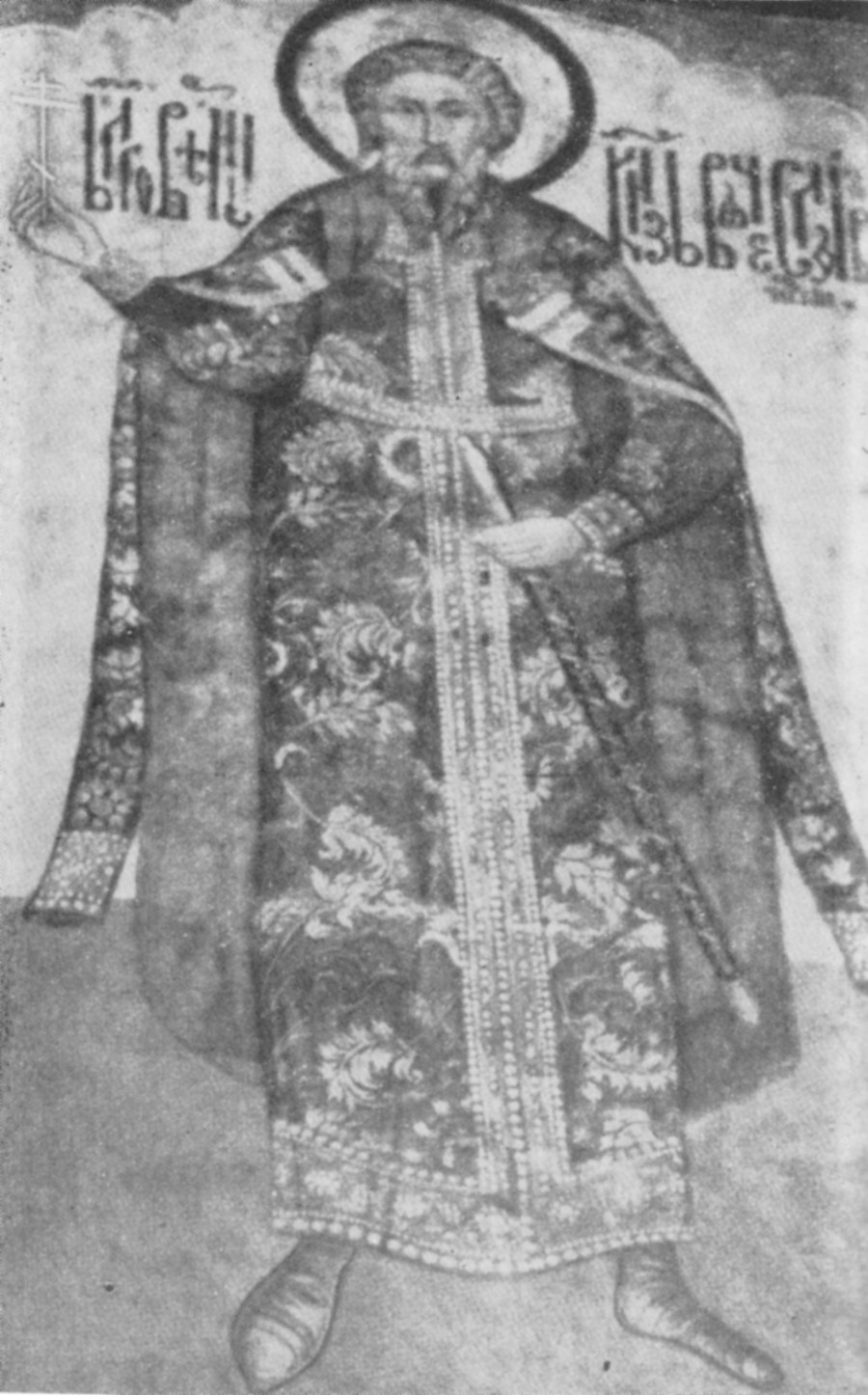
St. Wenceslas (XVII-century fresco, St. Sergius-Trinity Monastery)
![]()
155
Notes to the Life of Wenceslas
1. The first part of this passage seems to allude to the beginning of Acts 2:17: “And it shall come to pass in the last days, saith God .. The second part of the passage paraphrases loosely the beginning of Mark 13:12: “Now the brother shall betray the brother to death, and the father the son .. With its allusion to the present in the opening lines, this passage has been interpreted as a definite indication that this work was written soon after the saint’s death. See Václav Chaloupecký, Na úsvitu kreštanství (Prague, 1942), p. 257.
2. This passage is very elliptic in OCS and simply reads, “i vrazi domašnii,” which translated literally means “and foes of the household.” I have embellished my translation by following Matthew 10:36 literally.
3. The first half of this passage paraphrases Matthew 10:35: “For I am come to set a man at variance against his father, and the daughter against her mother, and the daughter-in-law against her mother-in-law.” The second part of the passage paraphrases Matthew 16:27: “For the son of man shall come in the glory of his father with his angels; and then he shall reward every man according to his works.” Cf. also Psalm 62:12; Jeremiah 25:14; Romans 2:6; II Timothy 4:14. Indeed the entire opening paragraph (see notes 1 and 2) is made up of paraphrases of biblical texts, which confirms the author’s familiarity with the Bible and speaks in favor of his mastery of the style of the ancient Cyrillo-Methodian usage.
4. Vratislav I was Prince of the Premyslide dynasty and his brother Spytihnev’s successor. He is believed to have been born around 883; however, the dates of his rule are uncertain, since Spytihnev’s death is placed variously within the ten-year period 905—915. He is a very vague figure in Czech tradition, which has him as a Christian, a great prince distinguished in glory, and builder of the first Church of Saint George in Prague. After the death of Louis III (899—911), he, taking advantage of the decline of the Eastern Frankish Empire, extended his power over a good deal of former Moravian territory. It is generally assumed that he died while defending his country against a Magyar invasion in 920—921. He was succeeded by his son Wenceslas I (see note 6).
5. Drahomira (Dragomira/Drahomir) was the daughter of a Veletian chieftain. The Veletians were a Baltic Slavic tribe who were known as Ljutici (Wild or Fierce Men) and for their long and vehement resistance to Christianity. Curiously however, Drahomira was given in marriage to the Christian ruler of Prague. Upon the death of Vratislav, the government as well as the children were entrusted to Ludmila, the latters’ grandmother (see note 10), which gave rise to the ensuing conflict between daughter-in-law and mother-in-law. In the opinion of the Czech chronicler Cosmas of Prague, Drahomira remained a pagan even while living among the Czechs (see Češskaja khronika [Moscow, 1962], p. 58). She is also described as a hardened pagan by Gumpold. On the other hand,
![]()
156
there are sources that attest to her being a Christian (see V. Novotny, Češke dějiny [Prague, 1912], p. 450). Attributed to her is the murder of her mother-in-law Ludmila and the building of Saint Michael’s Church in Tetín.
6. According to tradition, Wenceslas I (Saint) was born around 906—907 at Stochov near Libusin. Some sources give his date of birth as early as 904. It is a generally accepted practice in translating from Slavic to use the Latin version of his name rather than the Czech, Václav, or Russian, Vjačeslav.
7. Two interpretations exist on the significance of the “tonsuring” of young Wenceslas. On the one side it has been understood to indicate that Wenceslas was intended for service to the church. Seven or eight was the usual age for dedicating a boy to a monastery, a practice that was known among the Slavs and other European peoples. Hence, the ceremony of hair shearing was a form of commendation (see A.P. Vlasto, The Entry of the Slavs into Christendom [Cambridge, 1970], p. 93). This interpretation would be quite plausible were it not for the fact that Wenceslas was the eldest son and, by virtue of primogeniture, the successor to his father’s throne. And if he were the younger brother, as is suggested by one source, how are we to explain why Boleslav (see note 13) was passed over for succession. On the other side, this act has been viewed as a ritual which marked a boy’s transition from boyhood to adolesence, a practice that was known among the Western and Eastern Slavs but not known in the West (see Skazanija o načale češskogo gosudarstva [Moscow, 1970], p. 56). It has also been pointed out that as described in this work, the tonsure was administered according to the Eastern Rite (see V.Chaloupecký, p. 257).
8. According to the Croatian Glagolitic variant of this work, the bishop’s name was Notar. No bishop of this name is known from any other source; however he could have been a bishop of the Slavic Rite in the Archdiocese of Moravia. The name itself does not appear to be of Slavic origin. It is also possible that Notar is a misconstrued form of the noun for “notary” (notar’).
9. This church is no longer extant. According to historical sources, it was located in Prague between the city gates and the Church of Saint Vitus (see note 28). It is the words, “in the Church of Saint Mary”—which appear only in the Vostokov Variant—that have been regarded by many scholars as proof that the First OCS Life was of Czech origin. Only someone intimately familiar with tenth-century conditions in Bohemia could have written about this church (see V. Chaloupecký, pp. 257-58).
10. In the tradition Ludmila (Ludmilla/Ljudmila) appears as an ardent Christian. Unfortunately for her, she was the victim of Drahomira’s abortive bid for power. Encouraged, it seems, by a powerful party of semi-pagan nobles, Drahomira had her mother-in-law assassinated during a palace revolt immediately following Vratislav’s death. On 16 September 920/21 Ludmila was strangled. Her death made a deep impression on the people and she was soon considered a martyr for the faith. It is not
![]()
157
known to which Slavic priest Ludmila entrusted her grandson. Speculation has him as Paul, Ludmila’s confidant and confessor (see note 41).
11. The ancient site of the town of Budeč, located northwest of Prague, is preserved remarkably well until this day. Also preserved are the ruins of the Church of Saints Peter and Paul to which was attached the school in which Wenceslas was educated. The Second OCS Life of Wenceslas mentions the name of the saint’s tutor at Budeč. It is given as Učen, which could be an epithet applied to him meaning “learned.” It is of interest to note that mention of Wenceslas’ knowledge of Greek seems to confirm that the Greek language was indispensable to the Slavic ecclesiastical circles as long as the Cyrillo-Methodian literary tradition was fostered in Bohemia.
12. Apparently the principle of primogeniture, which was not universally followed at that time, was invoked in this case by the reigning prince on behalf of his eldest son. In this act it is possible to see the influence of Constantinople.
13. Boleslav I of Bohemia (Boleslas I) was the younger brother of Wenceslas. See also notes 30 and 48.
14. Vratislav and Drahomira had seven children, three sons—Wenceslas, Boleslav, and Spytihněv—and four daughters. Of the latter only the name of one, Pribyslava, has come down to us. She was given in marriage to a Croatian prince. It should be noted that there are scholars who consider this statement erroneous (see V. Chaloupecký, p. 258).
15. Compare Matthew 25:35-36. The list of Wenceslas’ good deeds is based on the six corporal works of mercy taken from Matthew 25:35-39 and frequently included in medieval confessional formularies. Here it echoes the Western (Roman) prayer formularies which once again indicates that the author of this work was a priest of the Slavic Rite but of Western (Roman) orientation.
16. That Wenceslas was eighteen at the time of his father’s death, as indicated, has to be rejected. The source of this inaccuracy is perhaps the mistaken transposal of a Glagolitic numeral into Cyrillic, viz., the confusion between the somewhat similar in appearance Glagolitic numerals 3 and 8 (see V. Novotny, p. 452). Wenceslas was certainly closer to thirteen years of age than to eighteen. Had he been eighteen, there would have been no need for a regent, for he would have been considered of age.
17. This passage alludes either to Luke 22:3, “Then entered Satan into Judas surnamed Iscariot, being of the number of the twelve ...” or to John 13:2, “And supper being ended, the devil having put into the heart of Judas Iscariot, Simon’s son, to betray him.”
18. I have not be able to trace the origin of this quotation. It is not from the Bible.
19. The names in this passage seem to be inverted. Since it is Boleslav’s counselors, it is he who is being incited. Thus, the passage should probably read: “And Boleslav was incited, being told: ‘Wenceslas wishes to slay you and has taken counsel with his mother and his men.”
20. The precise cause of conflict between Wenceslas and Drahomira is
![]()
158
a matter of speculation. It might have been because Wenceslas, upon ascending the throne (924/25), had the property appropriated by Drahomira from Ludmila’s priests returned to them (see V. Novotny, p. 463); or that Drahomira was fomenting trouble between the Christian and semi-pagan factions in the country—a charge that was leveled against her by Wenceslas’ friends. Whatever the reason, Wenceslas had his mother banished to Budeč.
21. As indicated, this is a verbatim quotation from Matthew 19:19. However, the words are not those of the Apostle but of Christ himself. The first part of the quotation is given in the words of the Apostle Paul in Ephesians 6:2: “Honor thy father and mother; which is the first commandment with promise.” Of course the source of the quotation is the Old Testament, Exodus 20:12: “Honor thy father and thy mother: that thy days may be long upon the land which the Lord thy God giveth thee.”
22. In attributing this thought to his hero, the author takes only a small relevant portion from Acts 7:60, changing only “their” to “my.” The entire passage reads: “And he kneeled down and cried with a loud voice, ‘Lord, lay not this sin to their charge.’And when he said this he fell asleep.” It might be useful to observe that Stephen, who spoke these words, was the first martyr of the primitive Christian Church.
23. The Slavic passage substitutes “ignorance” for “transgressions” from Psalm 25:7: “Remember not the sins of my youth, nor my transgressions: according to thy mercy, remember thou me for thy goodness’ sake, O Lord.”
24. This is only a fragment from Matthew 25:35, which was spoken by Jesus to his disciples. The entire passage reads: “For I was hungered, and ye gave me meat: I was thirsty, and ye gave me drink: I was a stranger, and ye took me in.”
25. The term “God’s servants” is a metaphor for the clergy or clergymen, a dignity by which the Catholic clergy was known in the West. Household bond-servants, as the name suggests, were the last category of bondsmen to survive of an institution which by the tenth century was rapidly disappearing among the Czechs (see Skazanija o načale, p. 57). In my translation I have added the verbal phrase “happened upon” because the Slavic original lacked a verb.
26. The original OCS sentence reads: “ašte li že kotoryi popinъ prodanъ pride k nemu onъ iskupaše vsěmъ.” The specific reference of “vsěmъ” is difficult to determine; it is assumed here to be an instrumental singular (expected form ‘vsěmь’), since it apparently made sufficient sense by itself. I have translated it accordingly. It is interesting to note that the Menology Variant of the manuscript has this word as the dative plural ind. obj. of a verb), viz., “i dobro tvoreše vsem” ‘and did good unto all.’
27. It seems that it became customary in Moravia from the time of Rostislav to assign priests from “all nations” to serve the newly-founded churches. More precisely, however, “all nations” can be reduced to three in particular, Germany, Italy, and Greece, as indicated in The Life of Methodius (see M. Kantor and R.S. White, op. cit., p. 75).
28. The Church of Saint Vitus (Saint Guy)—the patron saint of Saxony, who
![]()
159
became the national patron of Bohemia—was built in Prague between the years 926—929. The remnants of this ancient church were discovered during the archeological excavations in 1911 and 1928. The original church was built in the form of a rotunda, a shape inspired by Carolingian architecture, and was rather widely imitated in Bohemia (see J. Cibulka, “Václavova rotunda sv. Vita,” Svatováclavský sborník [Prague, 1933], pp. 344-48; and H. Weidaas, “Zur Frage der Przemyslidischen Rundkirchen,” Kyrios, 11 [1937], pp. 279-312). Today at this location stands the Gothic Cathedral of Saint Vitus, which dates from the reign of Charles IV (1347-1378).
The line “bearing no malice” refers to Wenceslas’ substitution of patron saints (see note 29).
29. Saint Emmeram’s Day was celebrated on the 22nd of September. He was the patron saint of Bavaria and Regensburg, to which Bohemia was ecclesiastically subordinated. The vow to Saint Emmeram is connected with events which followed the deaths of Vratislav and Ludmila. Uncertain about the direction which Bohemia would take under Drahomira’s regency, Arnulf, Duke of Bavaria, made a trip to Bohemia where he was assured by young Wenceslas that all would remain unchanged. As a gesture of good will Wenceslas promised to dedicate the church he proposed to build in Prague to saint Emmeram. As we know from the foregoing comment, Wenceslas, despite this promise, dedicated the church to Saint Vitus (see F. Dvornik, The Slavs, Their Early History and Civilization [Boston, 1959], pp. 106-107).
30. The conflict between Boleslav and his brother may be traced to a number of causes which developed as a result of their differing personalities and differing preferences. Whereas Wenceslas was pious and inclined to the ascetic life, Boleslav was worldly and ambitious to rule. Furthermore, Wenceslas, at least according to the sources, had identified himself with the Saxons and personally supported Latin priests, but Boleslav favored the Slavic Church. All sources attest to Wenceslas’ Christian virtues, none to his virtue of command. Since political needs had not in themselves changed with the acceptance of Christianity, Slavic rulers had also to be military leaders, a capacity which Wenceslas apparently lacked and Boleslav had. Thus, Boleslav was pushed into leadership of the anti-Saxon party, and was an accomplice in his brother’s assassination (see A.P. Vlasto, pp. 94-96).
31. Boleslav’s town is present-day Stara Boleslav, a town situated northeast of Prague.
32. The feast days of Saints Cosmas and Damian are celebrated on June 30th and November 1st in the Orthodox Church but on September 27th in the Roman Catholic Church. The church dedicated in their honor in Stara Boleslav no longer exists. In its place now stands Saint Wenceslas Church, which some believe incorporated sections of the old church, an opinion which is not shared by all the sources.
33. A comparison of this passage with a similar one in the Second OCS Life, chap. 18, reveals that in this work the event takes place at Boleslav’s town
![]()
160
with friends as opposed to taking place in Prague with his retinue. Furthermore , whereas here the expression nača igrati ‘ began to sport’ indicates the engaging in sport, perhaps a knight’s game, the same expression in the Second OCS Life seems not to refer to sport but rather some military exhibition.
34. It is interesting to note that this is now the third time counsel has been taken against Wenceslas by the conspirators. This number of occurrences can hardly be taken literally, given the mystical significance of the numeral 3, and the fact that “trebling” is a literary cliche in works of this type.
35. Since this passage is elliptic and reads simply to ti B ̃g, brate (verbatim: May God this to you, brother), I have added the verb ‘forgive.’
36. Apparently Boleslav had ordered the priest to lock the doors to the church in order to prevent Wenceslas from seeking sanctuary. Indeed, an account of a traitorous priest, who on orders from the conspirators locked the church doors, is found in Christian’s work.
37. The words of Jesus taken from Luke 23:46 serve as a formula in Vitae, both East and West, for the dying words of a saint.
There is a scribal error in the word “gave up” ispusti which reads instead nepusti ‘did not give up ...’ (!)
38. The Croatian Glagolitic Variant of the Life refers to Mstina (Mastina) as etera častna m̑a veštes’ lava ‘an honorable man of Wenceslas.’ Perhaps he was a nobleman who supported Wenceslas, or one of his retinue. Whichever, his is the only death which is mentioned specifically.
39. The persecution of the clergy after Wenceslas’ death was limited to those clergymen who were closest to the saint. It was not a resurgence of paganism on the part of Boleslav and his followers. The phrasing of this passage makes it appear as though the “wives” of God’s servants (i.e., priests) were given to other men. What is undoubtedly meant is the wives of the members of Wenceslas’ retinue.
40. Drahomira fled to the Duchy of Croatia and, apparently, found refuge among the White Croatians, a tribe living north of Prague.
41. According to several legends dealing with Saint Wenceslas (e.g., Christian’s), Paul was priest and confessor to Ludmila and Wenceslas. It is to him that Jakobson attributes The Life of Ludmila, one of the oldest Czech historical legends (see Roman Jakobson, “Minor Native Sources for the Early History of the Slavic Church,” Harvard Slavic Studies, II (1954), p. 57.
42. A verbatim translation of this line would read, “his blood did not want to go into the ground” (kroviž ego ne xotešti. . . v zemlju iti). The exact meaning of this passage has been a point of controversy among scholars. For a discussion of this see V. Chaloupecký, pp. 262-63.
43. Compare John 2:19. It appears as though this is an allusion to Christ’s remark: “Destroy this temple, and in three days I will raise it up.” There is also the legend of Saint Therapon and the great oak tree that grew up from the ground his blood had soaked (see Hippolyte Delehaye, The Legends of the Saints [New York, 1962] ,pp. 30-31).
44. There is some controversy concerning the significance of this passage.
![]()
161
In the opinion of some researchers the expectation of more miracles attests to the great antiquity of this literary monument. Therefore, J. Kalousek assumed that the Vostokov Variant of the Life came into being before the year 967, the specific year that Widukind (the Saxon chronicler) dated Wenceslas’ first miracles. On the other hand, 0. Kralik believed that the author of this work simply lacked sufficient information about the saint’s miracles in order to enumerate them in a separate section. For further details see Skazanija o načale, p. 58.
45. Wenceslas died in the year 929, a date that is generally accepted on the basis of Christian’s Legend (see F. Dvornik, Byzantine Missions Among the Slavs [New Brunswick, 1970], p. 402). The date 6337 (sic—should actually read 6437) attests to the use of the Byzantine system of chronology, which was introduced to Bohemia by the disciples of Constantine-Cyril and Methodius. This system is based upon the number of years from the Creation. Accordingly, the Nativity took place in 5508. By subtracting this number from the one given in the text, one should arrive at a date which corresponds to the calendar used in the West. In the present case we arrive inexplicably at the date 829.
An indiction was a fiscal period of fifteen years. The third cycle (or arc of the sun) refers to the sun’s orbit, hence autumn.
The veneration of Wenceslas increased greatly after his death, which was soon accounted a martyrdom. He became a national hero, the national saint and celestial protector of the Czech nation—a dignity which endures in the hearts of many Czechs even to this day.
46. The image of a stony heart is found in Ezekiel 11:19: “And I will give them an heart, and I will put a new spirit within you; and I will take the stony heart out of their flesh, and will give them an heart of flesh.” This passage is repeated again almost verbatim in Ezekiel 36:26.
47. This passage is a paraphrase of Psalm 51:3: “For I acknowledge my transgressions and my sin is ever before me.”
48. In 932 Boleslav, who succeeded to power, had the relics of his brother brought to Saint Vitus Church in Prague. The actual date of the translation was the 4th of March, as attested by the Prologue, The Second OCS Life, and other sources. The confusion of the numerals 3 and 4 resulted from the differing numerical values of the letter G, in Glagolitic (4) but in Cyrillic (3). Obviously, in copying the text from the Glagolitic, the scribe failed to substitute the numeral into its proper Cyrillic equivalent.
It should be noted that Boleslav, like Wenceslas before him, had to accept the overlordship of the King of Saxony, Henry the Fowler (919-936), and the same political status. With the death of Henry in 936, Bohemia was again relatively free and continued to prosper through Boleslav’s reign. Christianity spread from town to town under the hegemony of Prague, which was constituted a bishopric shortly before Boleslav’s death in 967 (A.P. Vlasto, pp. 96-99).
49. There is a curious omission of the preposition “from” (ot) in this passage, without which the sentence reads “awaiting the resurrection of Our Lord Jesus Christ” (čajušte vъskrsenię g̃a nasego ic̃a x̃a).
